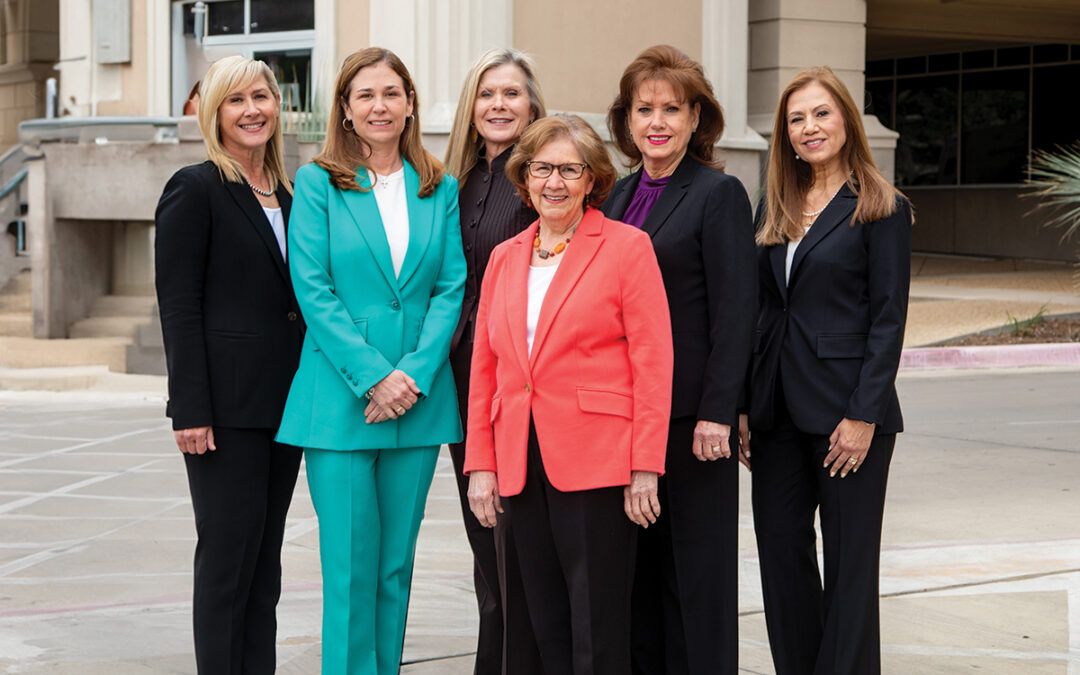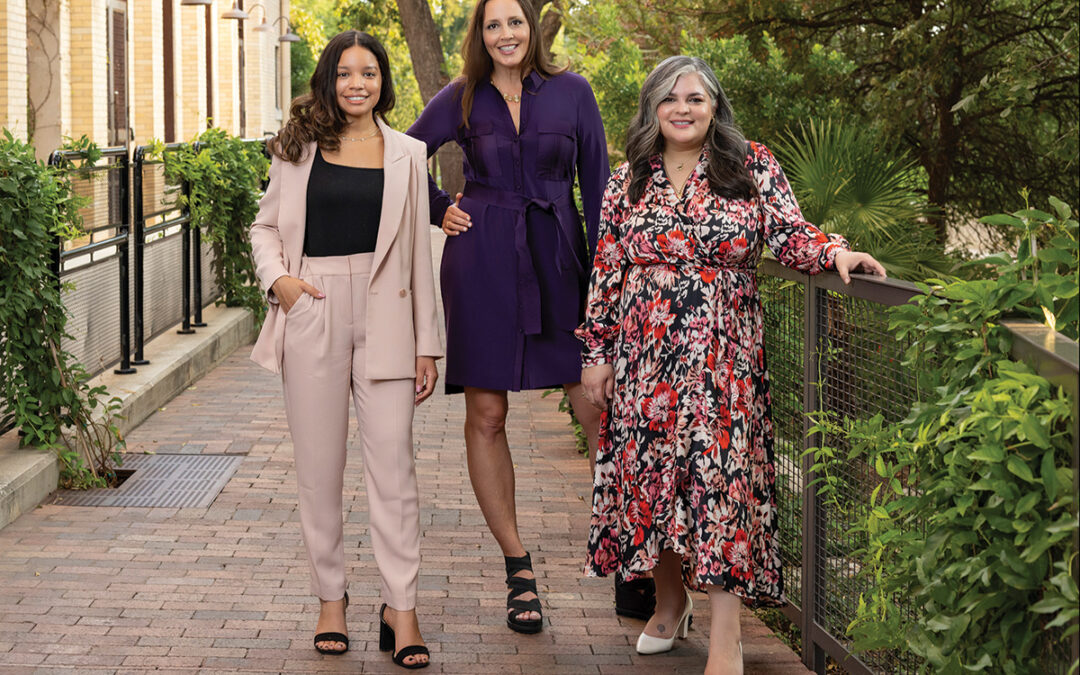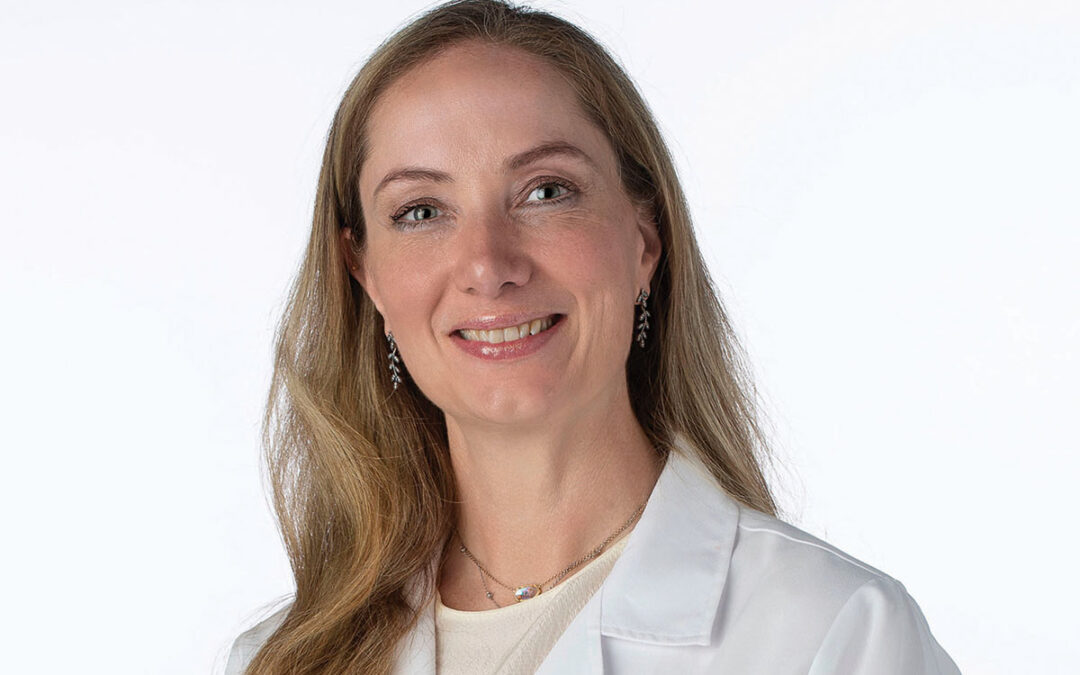From multinational companies to Mom-and-Pop storefronts, the family business is still the heart of American enterprise. It’s estimated that 80 percent of U.S. companies fall into this category.
Choosing a spouse as a business partner seems like a no-brainer: You know and trust the person, and you already share a commitment to your path in life on a personal level. If your strengths and expertise complement each other, it may seem like all there is left to do is show up to work.
Most couples in business together will say that it’s not as easy as that, but, as you’ll read here, five San Antonio women who work with their husbands have experienced renewed passion for their chosen careers or unearthed hidden talents that led to success in surprising places.
ALICE PEÑALOZA
-Peñaloza & Sons
As a little girl, Alice Peñaloza loved to play with jewelry. As a young woman, she worked for a jeweler and marveled at how pieces were designed and manufactured. When her boss asked her if she’d like to learn, she started by sizing rings. Gemology school followed, and, returning to San Antonio as one of the few women gemologists, she got a job at Peñaloza and Sons. She remembers feeling a strong pull toward her co-worker, Paul Peñaloza, the son of the shop’s founder. “We were best friends for years,” she says. Friendship grew into love, and the pair married. When her husband took over the business, she says that, although many of her job responsibilities stayed the same, other roles “evolved.” She still does the job she was hired to do nearly 20 years ago, but she says she’s now involved in more decision making. “I married into a family business, but because I’m married to the owner, my input has more weight than it might otherwise have,” she says.
Being in the jewelry business before she met her husband, and being such good friends before taking on romance and marriage, all add up to an ideal life for Peñaloza, who can’t imagine not spending so much time with her husband. “Some couples have no idea what’s going on in each other’s lives, and I can’t imagine not knowing,” she says. She says that their compatibility is sometimes defined in their differences. Their tastes in jewelry are a good example: “He’s more traditional and buys things I would never look at, but we bring them into the shop and they sell, so he knows what works.” She favors unusual, one-of-a-kind pieces. “It offers balance,” she says. Knowing each other so well and remembering that they are both working toward the same goal helps resolve any conflict. “If we talk about it, we can always figure out what the answer is,” she says. She loves to see clients wearing jewelry from their shop. “People come to us in happy times,” she says. “We have so many customers who have been coming to us for years, and we know their style and personality, which helps us find the right pieces for them,” she says.
Over the years, some of their customers have become personal friends. “For me to love jewelry as much as I do, and to be here, things couldn’t have turned out any better,” she concludes.
JAMIE ALLEN
-Texas Creative
After years of working in corporate marketing and advertising, Jamie Allen decided to take some time off from her career to spend time with her kids. Her husband, Brian Eickhoff, owned a successful firm that specialized in design for print media and advertising. But, as in many businesses, they found themselves at a crossroads after Sept. 11, 2001. “We had no way of knowing that 9/11 would change so many things,” Allen says. Many of the agency’s clients had put an abrupt hold on their marketing and advertising efforts; the business stayed aloft with just a few core clients. Along the same timeline, the Internet was changing the way people respond to advertising messages. Allen’s business background helped her see that it was time for her husband’s business to adapt to a new business climate. She never thought she’d work with her husband, but they made a deal: She would come to work for him — as an employee, not a partner — with the understanding that if it wasn’t going well, he was free to let her go. Allen made quick work of helping her husband change the direction of the firm. With a new name — Texas Creative — and expanded capabilities, the firm moved beyond its print design roots into the new generation of electronic media. “We needed to increase our revenue streams and create diverse offerings,” Allen says.
As much as the business changed externally, things were changing on the inside as well. Allen went in believing that if employees felt valued and appreciated, they would take as much care with the success of the company as she and her husband do. “Brian and I serve our employees and clients, not the other way around,” she says. The couple created a family-friendly work environment to help staff members bridge their work and personal lives. “We make it clear that family is the priority, and we offer flexible options because we want our employees to feel the same way we do — that this is a great place to work,” she explains. Away from the office, Allen is content with more domestic pursuits. With a daughter in college and a son in high school, Allen relishes her role as soccer mom, band mom and school volunteer.
Allen has always used her maiden name professionally, so many people aren’t even aware that she and Eickhoff are married. She is careful about how she positions their personal and professional relationship. “Our relationship is not personal at work,” she says. “We’ve learned to communicate with each other in a nonthreatening way. We have a lot of unspoken rules that come from situations we’ve experienced elsewhere,” she explains.
Allen has one rule that helps her keep things in perspective and her path clear: “All of my decisions at work are built around making Brian successful,” she says.
DEBBIE RUNNELS-PENDLEY
-River Oaks Pools
When Debbie Pendley started working for River Oaks Pools in the late 1990s, she was a recently divorced mother at a crossroads: She needed a job if she wanted to stay in San Antonio with her three children. Her other choice was to move back to her parents’ pig farm north of Houston. “My kids did not want to go to the pig farm,” she says. “I had to find a way to stay here.” A friend suggested a job in sales with River Oaks Pools. She had no sales experience, but she had worked for a landscaping company. She reminded herself of the pig farm and took the job. She was acquainted with the company’s owner
, Dan Pendley, but their relationship was strictly professional for the first four years that she was with the company.
In that time, she built a reputation as a pool designer. One of her early designs is now one of the most popular — and most replicated — pools in the nation. Her designs were being featured in publications around the world, and her expertise was increasingly in demand. It was a surprising career turn, to be sure, but life wasn’t yet done handing out surprises. When she learned that the company’s owner was interested in dating her, she wasn’t looking for a relationship, and she was unsure of how to go about dating her boss. The two learned that they were a good match, personally and professionally. After three years of dating, they married in 2005. Today, they work much as they did before: Dan as the owner, oversees staff and operations, and Debbie creates special project designs.
Pendley accompanies her husband to trade shows, where they research market trends and get fresh ideas. “A lot has changed in the pool market,” Pendley says. “Pools used to be kidney-shaped or rectangular. Now, people want what they see in magazines and from their travels. They don’t want the same pool their neighbors have.”
Pendley says their relationship at work and as a couple relies on collaboration and compromise: “We both have so many ideas that sometimes the answers come easily, but other times we only see things from our own perspective.” She admits that even when they butt heads, they go back to their common ground and put conflict aside pretty quickly. “We have a good foundation. We had that respect for each other before we were involved romantically,” she says. At home, each has individual office space, where their tendencies offer balance: Pendley is the early riser, and her husband is the night owl. “One way we stay connected is through e-mail that I send late at night and he answers in the morning,” she says.
Pendley and her husband have five children between them — two adult children from his first marriage and three from hers, ages 10, 15 and 22. Her eldest daughter, Shelley Skains, now works for the company as well, and, like her mother, has quickly built a successful sales career. Over time, Pendley says she sees the two of them as a design team, focusing on projects that will take them around the world. “I didn’t know I had this in me,” she says, reflecting on her surprising career. “I couldn’t have imagined this! Dan has been so supportive — he was always instrumental in letting me be as creative as I wanted to be. He saw something in me that I didn’t know was there.”
AMELIA DURAN
-La Prensa
You could say that Amelia Duran has ink and newsprint in her blood. Her father, uncles and grandfather all worked for the original La Prensa newspaper. As a child, she imagined the life ahead of her: “I told myself I was going to work hard and make a lot of money so I could have a big house, visit Mexico to see the pyramids and Cuba, where all the musical movies were made. I would have a Cadillac, and I would own some espadrilles.” She married Tino Duran, and the young couple moved to Dallas, where they both worked for a Spanish-language newspaper. Next was Fort Worth, where the couple started their own newspaper and raised their family. Duran felt the tug to return to San Antonio, and she was nostalgic for the old La Prensa that had such a big place in her memories. In 1989, she convinced her husband to come back home to resurrect La Prensa as a bilingual newspaper. The timing was excellent. The newspaper rose with the new trend toward reaching Hispanics as a specialty market. The couple has worked together for the 52 years they’ve been married. “We started out this way and we’ve been working at it ever since,” she says. “Now, this is just a piece of cake.”
She’s the early riser, and her husband prefers late nights, so he is the public face people associate with the newspaper. “My husband works late and attends the events,” she says. “I come in to the office, do what I need to do, then I go home.” Duran is careful with her time, and she takes care to listen to her body’s signals. Having lived with multiple sclerosis for years, she knows when she needs to slow down. Understanding how her husband thinks is key to the way they make decisions about the business. “We talk during the day, but if I feel like we are not getting anywhere, I wait until 3 a.m. when he wakes up and can’t go back to sleep. Then he hears me out,” she explains. She believes that much of their success in business and as a couple lies in their ability to give each other the space they need while finding ways to stay connected. Their jobs have them each doing different things, so some days their time together is more like moments passing in the hallway.
Because she loves to write, Duran sends notes to her husband, particularly if she senses a need for encouragement. “I love that he started doing the same,” she says.
For Duran, working with a spouse requires a heightened sense of propriety at work. “Be respectful of each other in the office,” she says. “You represent your business, and everybody is looking.” Even so, she admits that one of the greatest rewards of working with her husband is that “I get to hug and kiss him whenever I want.”
Away from work, Duran devotes time to their children, their grandchildren and the many foster children she’s cared for over the years. She supposes that if she hadn’t spent her life in the newspaper business, she’d have been a teacher. As for the life she imagined, Duran has done it all — almost. “I have gone to Mexico, and I have a Cadillac,” she says. “I did get some espadrilles, but I didn’t like them. Maybe I will get to see Cuba.”
CANDY SULLIVAN
-Choice Leather
After spending years as the owner of a shop in Jackson Hole, Wyo., Candy Sullivan was a homesick Texan. Though originally from Houston, she decided that San Antonio would be a better relocation choice. That was 13 years ago, and it turned out to be a lucky move. It was here that she met and married Pat Sullivan, who had made a career in the retail furniture business, first as the owner of a furniture store chain in Houston, and later working for a furniture retailer in San Antonio. Meanwhile, Sullivan was experiencing success in residential real estate. In 2004, the Sullivans opened Choice Leather. While her husband is responsible for the day-to-day operations, Sullivan puts her fashion merchandising background to work as the store’s merchandising manager, creating the vignettes, or displays, that take customers through their showroom. “It wasn’t a hard transition to furniture,” she says. “The same design principles apply.” Though their responsibilities are distinct, the couple travel together to the major furniture markets to stay on top of trends and to make buying decisions. “We balance each other out; I’m good with the creative end of things, and he’s good at running the business,” she says. “We identified our talents early on, and we try to work to our strengths.”
Even so, Sullivan admits that working with a spouse has its challenges. “You can’t assume that the other person is reading your mind,” she says. “We make a point to talk about what’s going on.” Decisions, she says, are made together. “We talk about the pros and cons to get to a place where we’re both comfortable. There’s no rubber stamp approach.” In addition to her role in the store, Sullivan has stayed active in her real estate career as well, and sees the combination as a good fit. “It’s really easy, especially with real estate, to get sucked into working seven days a week,” she says. Sullivan keeps the balance by being a careful guardian of her time. “I examine my priorities daily, and I find ways to recharge; I schedule private time like I would a business appointment, and I keep to it,” she says. Sullivan considers her move to San Antonio a lucky stroke; her marriage and work contribute to her good fortune. “Women have choices, and we can change what doesn’t suit us,” she says. “I came to San Antonio, and my life got really great.”
Author: Susan Sheffloe Speer









0 Comments